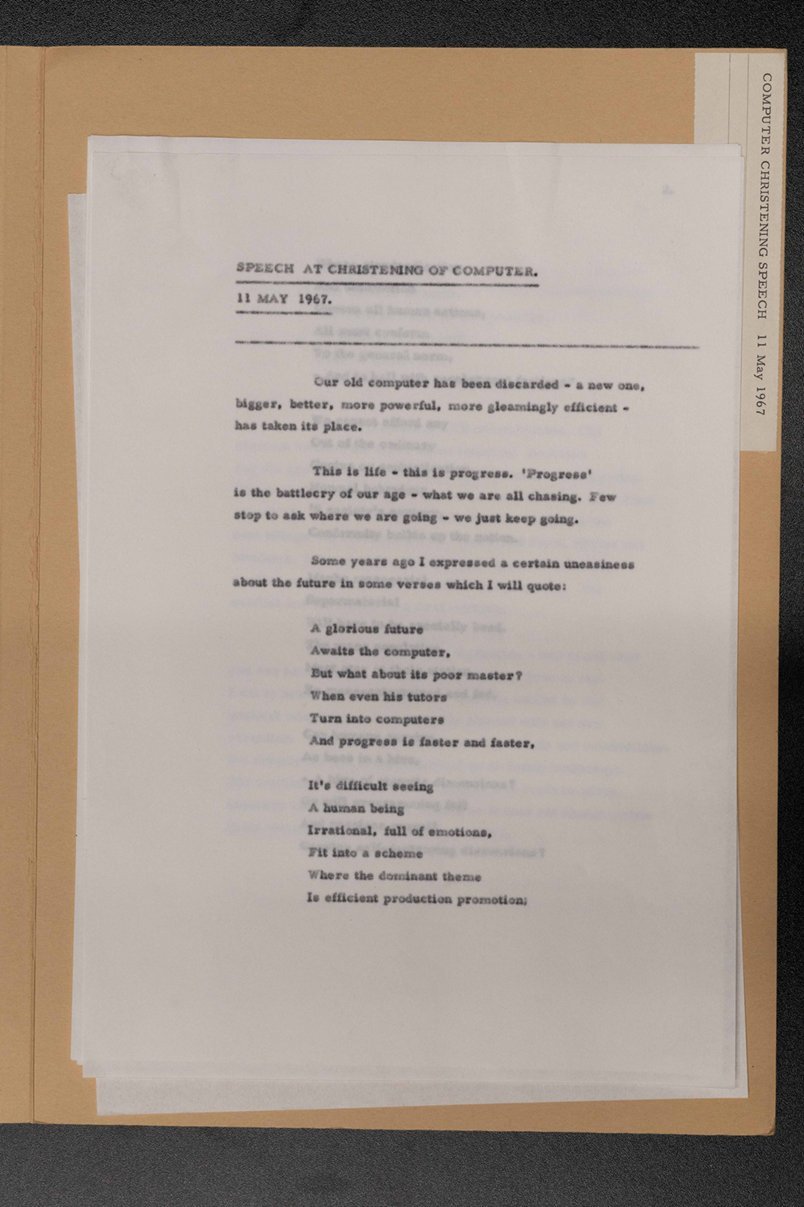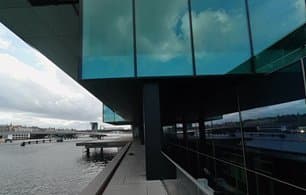A rediscovered 1967 speech by engineering pioneer Ove Arup offers timeless wisdom on balancing technological progress with human values. Delivered during a computer christening ceremony, his poetic address tackles automation anxiety head-on while championing technology as a tool for human flourishing.
In the depths of Copenhagen’s winter, an exhibition on engineering visionary Ove Arup revealed haunting fragments of a forgotten speech. For seven years, those fragments lingered in one technologist’s mind—a quest culminating in Churchill College’s archives with the recovery of Arup’s full 1967 "Computer Christening" address. This artifact isn’t just engineering history; it’s a masterclass in technological leadership that resonates powerfully in our AI-driven era.
 The recovered typewritten speech, courtesy of Churchill College, Cambridge Archives.
The recovered typewritten speech, courtesy of Churchill College, Cambridge Archives.
The Context: Automation Anxiety in 1967
Arup’s firm—pioneers of Sydney Opera House’s revolutionary design—faced a transformation. Their new computer, humorously named "Mumbo Jumbo," promised to accelerate complex structural calculations previously done manually by teams of engineers. Yet this efficiency sparked unease. As Arup acknowledged:
"A glorious future / Awaits the computer, / But what about its poor master? / When even his tutors / Turn into computers / And progress is faster and faster."
His poetic lines, written years earlier, foresaw tensions we still grapple with: the fear of cognitive displacement. Samuel Butler voiced it in 1863; Turing predicted it in 1951. But Arup addressed it directly to his employees during Mumbo Jumbo’s christening—a rare corporate acknowledgment of automation’s human cost.
 Arup engineers at work in the 1960s, when computational tools began reshaping design.
Arup engineers at work in the 1960s, when computational tools began reshaping design.
Leadership Through Vulnerability and Vision
What sets Arup’s speech apart is its blend of philosophical depth and empathetic leadership. He didn’t dismiss fears but reframed technology’s role:
"The machine does no harm—as long as it is made to serve humanity and human values, as long as it does not change people in its own image, turning them into robots."
His strategy was multifaceted:
- Naming as Taming: Dubbing the computer "Mumbo Jumbo" disarmed intimidation through humor.
- Radical Transparency: Sharing his own doubts about automation’s societal impact.
- Purposeful Optimism: Positioning computers as liberators from drudgery, enabling "better, more imaginative work."
The Military Shadow
Arup’s awareness of technology’s dual-use potential surfaces subtly. His firm’s computer, a Ferranti model, shared DNA with machines sold to militaries. In the speech, he cautions against tools that "in the wrong hands could do a lot of harm"—likely alluding to seeing firsthand how computation enabled warfare.
 Ferranti computers like Arup’s were among the first commercially viable systems, with military applications.
Ferranti computers like Arup’s were among the first commercially viable systems, with military applications.
Why This Speech Matters Today
As generative AI accelerates workplace disruption, Arup’s 56-year-old insights feel startlingly relevant:
- Rejecting False Binaries: He refused to choose between progress and humanity, arguing for "better technology" that augments rather than replaces.
- Ethical Proximity: Leaders must engage directly with those affected by technological change—as he did with his engineers.
- Guardrails for Innovation: "Human values" aren’t abstract; they’re the benchmarks for tool design.
Unanswered Questions
Despite this discovery, mysteries linger: Did Arup speak when adopting his firm’s first computer? Was Turing’s 1951 warning about intellectual displacement an influence? And crucially—how did his engineers feel hearing these words in 1967?
The full speech, available here, remains essential reading. In an age racing toward AI integration, Arup’s call to build futures that are "futuristic and bold, but also humane" isn’t nostalgia—it’s an operational blueprint.

Comments
Please log in or register to join the discussion